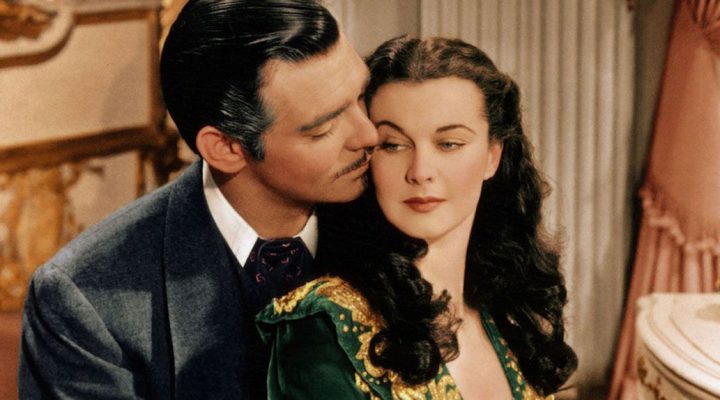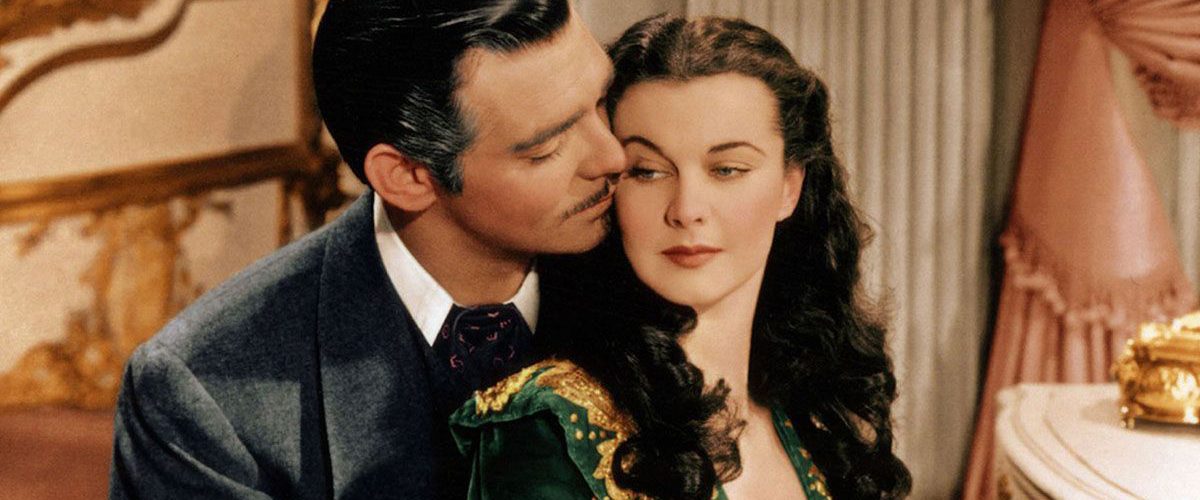Those of you who read this column are aware that I study culture, religion and political life to explore the myths by which Americans shape their lives, and that I’m particularly focused on questions of race and injustice. Knowing that, it should not surprise that I jumped at the chance when the venerable London Spectator asked me to write about the new book The Wrath to Come: Gone with the Wind and the Lies America Tells by Sarah Churchwell. Nor that when it proved to be an exceptional book, smart and searing and scary, a book that early on proclaims that America is a story that the nation tells itself, that I would want to talk to the author.

Sarah Churchwell
Sarah Churchwell is an American scholar and the author of Behold, America: A History of America First and the American Dream and Careless People: Murder, Mayhem and The Invention of The Great Gatsby. She holds the chair in public understanding of the humanities at the University of London, and although she was swamped with the British launch for the new book, she was kind enough to answer my questions about what The Wrath to Come might teach us about how we wrestle with the past and rescue the present. There is wisdom in this book, and in these responses.
Greg Garrett: Sarah, you argue persuasively that Gone with the Wind is a powerful reflection of America past and present. You have developed that argument throughout your new book, but could you briefly explain why you think a 1936 novel and 1939 film still shape our thinking? And how understanding what this narrative does and doesn’t do could help us come to grips with some of the great flaws in the American mind?
Sarah Churchwell: It’s partly that it shapes our thinking and partly that it captures our thinking — it registers America’s myths about itself and the desires that drive those myths, the desire to maintain our own sense of innocence at all costs, which is perhaps the most fundamental desire.
It’s a version of American history that says slavery wasn’t really that bad, that white people are the real victims of the Civil War and its aftermath, and that justifies the desire to reclaim and rebuild white power at any and all cost. It emotionally justifies clinging onto property, marginalizing Black Americans and their role in our national history, and it defends white narcissism, saying white people’s need and desires should always shape and define American history, society and power structures.
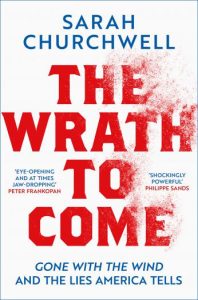 GG: Your epigraph for The Wrath to Come is from James Baldwin, who alternated between writing about America at a distance of an ocean and returning to America to work for civil rights. As another American writing from the distance of an ocean, does America fall into better focus for you by being away from it? What do you learn about America by being in England?
GG: Your epigraph for The Wrath to Come is from James Baldwin, who alternated between writing about America at a distance of an ocean and returning to America to work for civil rights. As another American writing from the distance of an ocean, does America fall into better focus for you by being away from it? What do you learn about America by being in England?
SC: A friend of mine who’s another American abroad in England calls it a “stereo” way of hearing America, which I really like: inside and outside, simultaneously. We can hear both viewpoints, understanding where Americans come from, but we also see much more clearly how our country is viewed by the rest of the world.
At the moment, it’s seen (in Europe, at least) as pretty much a madhouse. What you learn from living abroad is that your way of life is not the only way, that all the things that seem natural and obvious to you are not natural or obvious and certainly not inevitable. There are other ways of organizing society and other value systems and other perspectives and many of them have created markedly more stable and secure societies than the United States can currently claim to have done.
In terms of England specifically, I find the points of convergence and difference between American and English society quite fascinating. I could go on for hours about them.
GG: You argue — and I’ve done the same — that as disturbing as a film like Gone with The Wind might be, it’s also essential that we study and discuss it. How might conversations about the movie (and about your book) engage white Americans in discussing issues about race and American history? What other films or texts would you suggest as part of that effort?
SC: My hope is that subjecting Gone with The Wind to serious historical scrutiny and debunking it — beyond just saying “it’s racist” or “it glorifies the Old South” or “it perpetuates the Lost Cause” but taking a deep dive into it the way I did, to separate out the fact from the fiction and then looking long and hard at the facts — could encourage white Americans to confront our past more honestly.
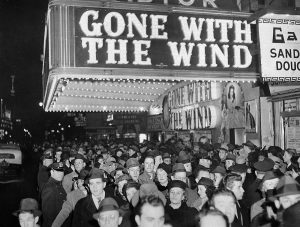
On Dec. 19, 1939, a crowd gathers outside the Astor Theater on Broadway for the premiere of “Gone With the Wind” in New York. (AP Photo)
We really do lie about our past to ourselves — not just about slavery, but as I show about histories of American fascism as well, about the Confederates who left America after the war (how many Americans know that story, the founding of Americana in Brazil as a slave colony, or the efforts to re-establish slavery in Mexico, or the connections to Mussolini two generations later that I discuss in my book?) — and telling the truth will, I think, help us see more clearly why we have the divisions we have, what they’re about, and that might help us figure out what we have to do to overcome them.
For me the other obvious book to do this with is To Kill a Mockingbird, which is much more self-congratulatory, mythologizing and frankly deceptive about the reality of American life in Alabama in the 1930s than most readers want to admit — because they love it. But it’s fundamentally dishonest.
I would be interested to hear which books you bring into the mix. I mention a few in my book that I think deserve rediscovery for what they have to say about these issues, including George Schuyler’s fascinating and largely forgotten Black No More and Nathanael West’s Day of the Locust, but I’d also bring in Faulkner, myself — Absalom, Absalom! is such an obvious book to teach against Gone with The Wind because they tell the same story in the same year in absolutely opposed ways. It speaks to the importance of close reading; but as I say I’d like to learn what other books people are teaching alongside this.
GG: Absalom is a core text for me for the good reasons you note, and because Baldwin engaged Faulkner so thoughtfully, recognizing the best and worst of both him and his work.
But to the present: Donald J. Trump seemed to some people a sort of radical figure cobbled out of America’s worst stereotypes, but your book suggests that he and the impulses he represents are deeply American. What did studying Gone with The Wind teach you about how someone like a Donald Trump could rise to power?
SC: I’ve always thought Trump was basically white America’s id writ large — not our worst stereotypes, but our worst impulses, one which as a society we used to work together to suppress. But when things broke down — and they did break down — he was the biggest, most malignant symptom that flew out between the cracks.
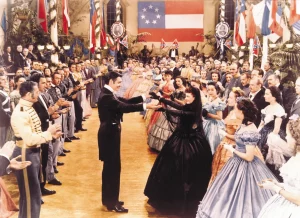 For me, Gone with The Wind captures Trump in its emphasis on the fact that Scarlett and Rhett are both gamblers and crooks in important ways — out for No. 1 and absolutely unscrupulous in their pursuit of wealth and power. Margaret Mitchell likens Scarlett to a confidence trickster at one point, and that, of course, is Trump. But Scarlett is the protagonist, although Mitchell intended her to be an anti-heroine and said it didn’t speak much of the character of the nation that they admired her so much. You could certainly say the same thing of Trump.
For me, Gone with The Wind captures Trump in its emphasis on the fact that Scarlett and Rhett are both gamblers and crooks in important ways — out for No. 1 and absolutely unscrupulous in their pursuit of wealth and power. Margaret Mitchell likens Scarlett to a confidence trickster at one point, and that, of course, is Trump. But Scarlett is the protagonist, although Mitchell intended her to be an anti-heroine and said it didn’t speak much of the character of the nation that they admired her so much. You could certainly say the same thing of Trump.
GG: Do you have any hope that “the better angels of our nature” might still be summoned to right things? What have you learned about how we can stop saying “Tomorrow is another day” and lean into the hard work of creating a just society?
SC: Yes, ultimately I hope my book shows how dangerous and futile it is for a society to think it can keep outrunning consequences. You can’t, and I think what’s happening in America today demonstrates the truth of that proposition. The chickens are coming home to roost, but we’re still largely in denial as a society.
Denialism is, perhaps, our single greatest national failing, and Gone with The Wind exemplifies it. Can we stop denying reality and the truth and start dealing with it instead? I truly don’t know — right now I wouldn’t say the omens are very good — although it has been interesting watching the January 6 hearings shift that needle.
The truth is coming out, despite the efforts of some very powerful people to deny it, and some of those truths are now being confronted. Can we keep doing that? I don’t know if we can, but I know we have to if we are going to survive as a democracy.

Greg Garrett
Greg Garrett is Carole McDaniel Hanks Professor of Literature and Culture at Baylor University and canon theologian for The American Cathedral in Paris. One of America’s leading voices on religion and culture, he is the author of more than two dozen books, most recently In Conversation: Rowan Williams and Greg Garrett and A Long, Long Way: Hollywood’s Unfinished Journey from Racism to Reconciliation. He is currently administering a research grant on racism from the Eula Mae and John Baugh Foundation and writing a book on racial mythologies for Oxford University Press. Greg is a seminary-trained lay preacher in the Episcopal Church and canon theologian at the American Cathedral of the Holy Trinity in Paris. He lives in Austin with his wife, Jeanie, and their two daughters.
Related articles:
Films on race can help us have hard conversations | Analysis by Greg Garrett

